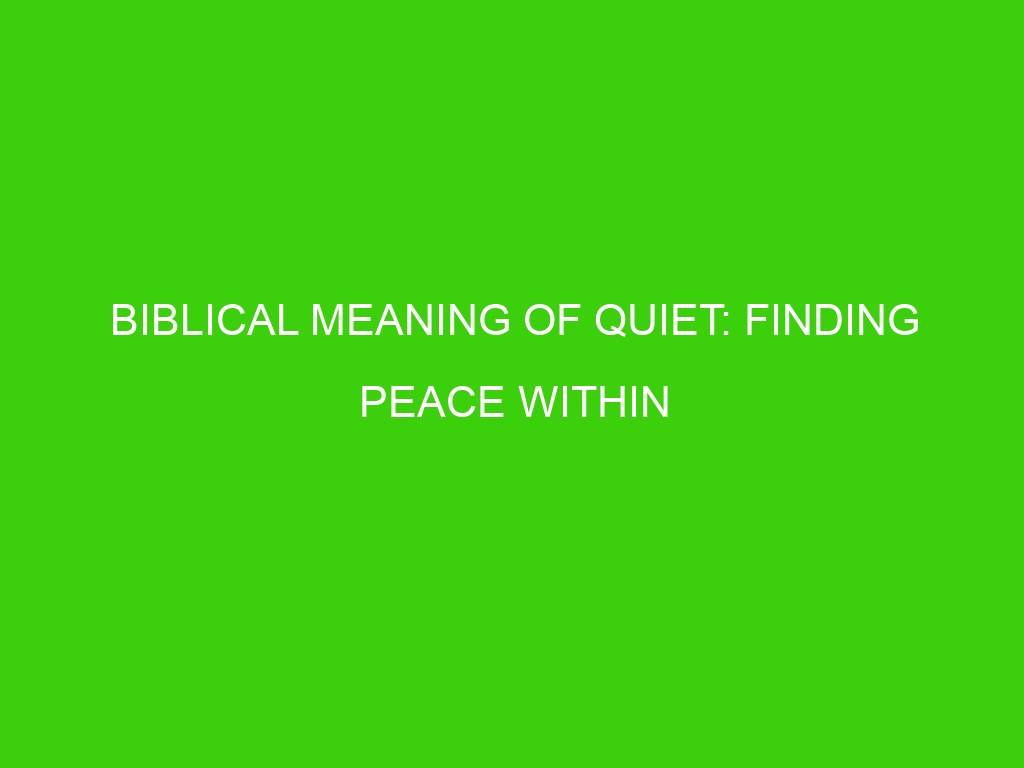Hey friend, sometimes life gets loud and chaotic, doesn’t it? The noise of the world can really start to wear us down if we let it.
But remember, there is an escape—a quiet, peaceful place we can retreat to even when things around us feel out of control.
In the Bible, the idea of “quiet” takes on a deeper meaning than just silence or stillness.
It’s about finding a calmness and confidence within, no matter how noisy the world gets.
God promises us this quiet peace if we seek it.
So come explore the biblical meaning of quiet with me.
Let’s look at what scripture says about how we can discover new depths of peace and rest for our souls.
There are treasures to be found in the quiet—let’s go find them together!
The Importance of Inner Quiet in the Bible
The Bible frequently refers to the importance of cultivating an inner stillness and peace.
In Psalms 46:10, we are told “Be still, and know that I am God.” This call to stillness is a reminder that when we quiet our minds, we can more clearly hear God’s voice and feel His presence.
Inner quiet also allows us to overcome anxiety and worry.
The Bible tells us in Philippians 4:6-7, “Do not be anxious about anything, but in every situation, by prayer and petition, with thanksgiving, present your requests to God.
And the peace of God, which transcends all understanding, will guard your hearts and your minds in Christ Jesus.” When our minds are racing and restless, it is difficult to experience this transcendent peace.
A quiet mind is essential for discernment and wisdom.
In 1 Kings 19:11-12, God speaks to Elijah in “a gentle whisper” after the wind, earthquake and fire.
We must cultivate inner stillness to perceive God’s subtle messages and gain wisdom and insight.
As Isaiah 30:15 says, “In repentance and rest is your salvation, in quietness and trust is your strength.”
Finally, inner quiet allows us to rest in God’s presence.
Psalm 23 depicts this beautifully: “He makes me lie down in green pastures, he leads me beside quiet waters, he refreshes my soul.” When we quiet our restless thoughts, we can experience the refreshment and nourishment of dwelling in God’s peaceful presence.
In our noisy, fast-paced world, developing a quiet inner life is challenging but so important.
Regular prayer, meditation on Scripture, and simply sitting in silence before God can help settle our minds and open our hearts to hear His gentle whisper.
Our souls long for this quiet refuge where we find strength, wisdom, peace, and rest in the shelter of the Almighty.
Biblical Verses About Being Still Before God
In today’s fast-paced world, finding quiet and stillness can be challenging.
Yet many Bible verses remind us of the importance of being still before God.
Be still and know that I am God (Psalm 46:10)
This well-known verse reminds us to stop striving and resting in God.
When we quiet our minds and bodies, we can deeply know God’s presence and peace.
Rest in the Lord (Psalm 37:7)
Anxiety and worry often stem from trying to control situations that are beyond our control.
This verse calls us to rest in the Lord – to relinquish control to God and trust in His sovereignty.
My soul waits in silence for God only (Psalm 62:5)
Waiting is difficult, but this verse says we should wait “in silence” and for “God only”.
Our strength and hope comes from Him alone.
Stillness helps us remember this truth and find renewal in God.
The Lord will fight for you, you need only to be still (Exodus 14:14)
When faced with challenges or opposition, our instinct is often to strife and struggle in our own strength.
But this verse reminds us that the Lord Himself will fight for us.
Our role is simply to be still and trust in Him.
Cultivating quiet before God yields many benefits.
It helps us reduce anxiety and find inner peace.
It allows us to deepen our intimacy with God and gain fresh perspective.
And it helps us remember God’s sovereignty and faithfulness, even in difficult times.
May these verses inspire you to find stillness today.
Be still and know that He is God.
How to Cultivate a Quiet Spirit According to Scripture
Find solitude.
The Bible frequently talks about Jesus seeking solitude to pray and commune with God.
Follow His example and carve out time each day to be alone with your thoughts.
Turn off your phone and find a place without distractions.
Use this time for prayer, meditation, or simply reflecting on Scripture.
Solitude helps quiet your spirit and allows you to focus on what really matters.
Slow down.
In our fast-paced world, it’s easy to feel rushed and hurried.
But Scripture calls us to rest and be still.
“Be still, and know that I am God” (Psalm 46:10).
Make an effort to slow down – limit multitasking and be fully present in each moment.
Take time to appreciate simple pleasures.
A quiet spirit is a rested spirit.
Trust in God.
When your mind is troubled and restless, it’s often because you’re trying to control situations that you can’t.
Release control to God through prayer and faith in His sovereignty.
“You will keep in perfect peace those whose minds are steadfast, because they trust in you” (Isaiah 26:3).
Learn to be anxious for nothing, but in everything, through prayer and thanksgiving, make your requests known to God (Philippians 4:6-7).
Fix your thoughts.
What consumes your mind will determine the state of your spirit.
Fix your thoughts on what is good and pure by meditating on Scripture and things that are praiseworthy (Philippians 4:8).
Shift negative and worrisome thoughts to gratitude and hope.
Listen to uplifting music and podcasts.
Be selective about what you read and watch.
Your thoughts shape your reality, so renew your mind daily to cultivate a quiet spirit.
With practice and God’s help, you can develop a quiet spirit through solitude, slowing down, trusting Him, and fixing your thoughts on things above.
Make space in your life for these disciplines and be transformed from the inside out.
The Connection Between Silence and Hearing God’s Voice
Being still before God has power.
When we quiet our minds and listen in silence, we open ourselves up to hear God speak.
Our hurried culture teaches us to always be doing and producing.
But silence and solitude allow us to rest from constant activity and turn our attention to the spiritual.
Find a quiet place free of distractions.
Getting away from the noise and busyness of everyday life is essential to hearing God’s gentle whispers.
Find a place where you can be alone, like a quiet room in your home.
Turn off your phone and any other electronics.
Ask God to speak to you and give you ears to hear what He has to say.
Be patient and listen.
Don’t just start talking to God about your needs and requests.
Take time to be still and listen.
Pay attention to any Scriptures that come to mind, any thoughts or impressions you receive, or any words you sense God speaking to your spirit.
God may speak through His Word, an inner knowing, a mental picture, or in a still small voice.
However He chooses to speak, be sensitive and receptive.
Write down what you hear.
As you listen, God may bring certain Scriptures, thoughts, or messages to mind.
Write these down so you can reflect on them later.
Look for any themes or impressions that seem significant.
And test anything you hear against the truth of God’s Word to confirm it’s from Him.
Reflect and obey.
Continue to meditate on what God spoke to you during your time of silence and listening.
Ask God for wisdom and discernment to properly understand and apply what you heard.
And be willing to obey whatever He asks of you.
Acting in obedience shows you truly value the voice of the Lord.
Spending time in silence and solitude, listening for God’s voice, can be challenging.
But it yields great rewards as you strengthen your relationship with Him.
You’ll find more clarity, direction, comfort, and wisdom when you make space in your life to hear from the Lord.
Finding Peace Through Biblical Quietness and Meditation
Peace does not come naturally to us in this fast-paced world.
Rather, true peace must be found by making space for quietness in our lives.
Practice Solitude
Find time each day to be alone, away from distractions and interruptions.
Jesus himself would withdraw to solitary places to pray and meditate.
Make a habit of rising a little earlier or staying up a little later to spend time alone with your thoughts and with God.
Turn off your phone and find a quiet space.
Let your mind settle and listen for God’s gentle whisper.
Meditate on Scripture
Choose a verse or passage of Scripture and read it slowly, paying attention to each word.
Meditate on its meaning and consider how it applies to your life.
Ask God to illuminate the truth of His word.
The Bible says “Blessed is the one…whose delight is in the law of the Lord, and who meditates on his law day and night.” (Psalm 1:1-2).
Meditating on Scripture leads to wisdom, peace, and prosperity.
Be Still
Simply be still before the Lord.
“Be still, and know that I am God.” (Psalm 46:10).
Sit in silence and invite God’s presence.
Release your anxieties, worries, and racing thoughts.
Breathe slowly and deeply, focusing your mind on God.
Allow His peace to fill you.
The inner quiet you cultivate in these moments of stillness will translate into calmness and clarity in your everyday life.
Pray
Talk to God about what’s on your mind and in your heart.
Pour out your gratitude, your fears, your hopes, and your dreams to Him.
Pray for others and for yourself.
Prayer is powerful – it can transform your outlook, ease anxiety, and bring peace that transcends understanding.
Develop a habit of continual prayer, praying without ceasing, and God’s peace will reign in your life.
Making space in your days for quietness, solitude, meditation, prayer and Scripture leads to inner peace.
As you draw closer to God, His perfect peace will fill you and overflow into every area of your life.
The biblical quietness found in stillness and solitude is a pathway to peace.



